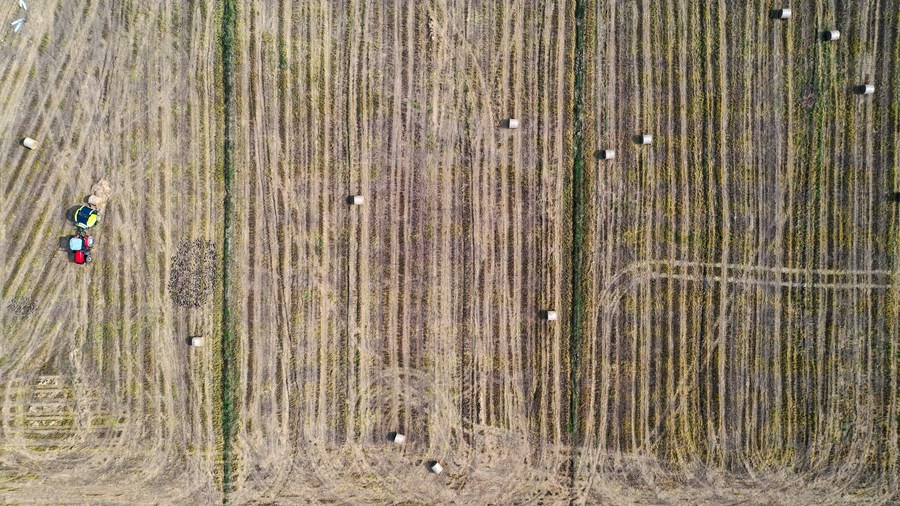Biotechnology turns waste into green feed

Aerial photo taken on Nov. 3, 2020 shows an agricultural vehicle collecting rice straw in the field at Jiangxiang Town of Nanchang County, Nanchang, east China's Jiangxi Province. (Xinhua/Peng Zhaozhi)
BEIJING, Dec. 25 (Xinhua) -- In Longzhou County of south China's Guangxi Zhuang Autonomous Region, farmers are busy harvesting sugarcane in the fields. Sugarcane leaves, which used to be waste, will be processed and made into cattle feed at local feed factories.
"In the past, sugarcane leaves and corn stalks were either dumped or burned. Now it can be used as feed. Last year, I earned 26,000 yuan (about 3,728 U.S. dollars) from selling stalks," said Ruan Zhenhong, a local farmer.
A new mode of industrial utilization of rice straw has also been developed recently in the city of Changde in central China's Hunan Province, as people have recycled rice straw and processed it into silage.
"Rice straw cannot be burned. The rotted ones left in the fields are an 'ecological burden.' They may affect the subsequent cultivation and lead to plant diseases and insect pests," said Luo Yuanfeng, an official with the bureau of agriculture and rural affairs of Changde.
China's feed industry is witnessing rapid development, transformation and upgrading. Promoting biological feed technology is an inevitable direction and strategic measure to ensure the high-quality development of China's feed industry, said Xin Guochang, an official with the Ministry of Agriculture and Rural Affairs.
Biological feed is the general term for a new feed resource and feed additive, which is safe, efficient, environmentally friendly and residue-free, and developed by means of modern biotechnology such as genetic engineering, protein engineering, enzyme engineering and fermentation engineering, according to a study report on China's biological feed industry.
Biological feed enjoys a wide range of materials. It is renewable and less expensive than special feed. The application of biological feed is helpful to developing unconventional feed resources and reducing breeding costs. It is also conducive to saving food and easing the problem of people and animals competing for food, the report said.
The biological feed can also reduce the discharge of nitrogen and phosphorus in livestock and poultry manures, greatly reducing environmental pollution and promoting the healthy and sustainable development of the animal husbandry feed industry.
In recent years, biological fermentation technology has achieved good results in improving feed quality and feed utilization efficiency, and promoting animal health. Ecological pig feeding is a good example.
"Bio-fermented feed is a kind of bioactive feed containing probiotics and their metabolites. Microbial fermentation can improve the digestibility rate of feed by changing the physicochemical properties of feed substrate," said Wang Yizhen, a professor at Zhejiang University.
He added that the bio-fermented feed can also improve pigs' intestinal function and body immunity through the effect of probiotics, helping ensure pig health and high-quality production.
China attaches great importance to the development of the biological feed industry. At present, there are more than 1,000 enterprises engaged in bio-fermented feed production in the country.
Chian has taken effective measures from the perspectives of the management system and technical standards to promote the standardization of the industry.
"The establishment of policies and standards has made important contributions to the rapid development of China's biological feed industry, with an annual output exceeding 4 million tonnes," Wang said.
Photos
Related Stories
- China's Jilin builds up strength in agriculture
- Xi Jinping delivers speech at central rural work conference
- Digital technicians help farmers work smarter, reap gains
- Saline agriculture helps boost farmers' income in coastal county
- China to expand use of organic fertilizers
- Study finds genetic solution to pre-harvest sprouting in rice, wheat
Copyright © 2022 People's Daily Online. All Rights Reserved.









